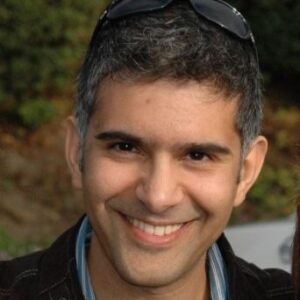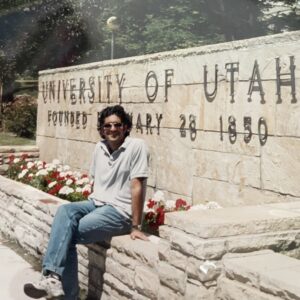When Omid Saadati arrived on the U’s campus in 1998 to study computer science at the College of Engineering, he had never owned a computer. That was not, however, his biggest concern; Saadati had recently emigrated from Iran, and though he already had a bachelor’s degree in civil engineering, he was worried about having to restart his education from square one.

Saadati was one of the first alumni of the Baháʼí Institute for Higher Education (BIHE) to continue their education in America. With no campus, classrooms, or formal accreditation, it was unclear whether anyone in Saadati’s new country would recognize the validity of his degree.
“Higher education was very much highly regarded in my family. My uncles and father all had engineering degrees, and my uncle even built castles for the Shah of Iran,” Saadati says. “Life without higher education was not one I wanted to live, so it was my mission to do whatever I could to study, with the dream of eventually coming to the United States.”
As a member of the Bahá’í Faith, Saadati’s education journey had roadblocks that his elders didn’t have to face. Iran’s largest religious minority, Bahá’ís had been systematically excluded from the country’s higher education system since the Islamic Revolution in 1979. In response, members of the community banded together to form an “underground” university, where students and teachers would secretively meet in private homes or send course materials and assignments through the mail.
Following his father’s footsteps, Saadati studied civil engineering under these challenging circumstances. But when the opportunity to join his sister in Salt Lake City arose after graduation, he took another radical step at the same time and plunged into the world of computer science.
With the dotcom boom in full effect and the U’s reputation in the discipline preceding it, Saadati was confident that this was the right career move, but had no idea whether he would be able to pursue it. The handful of fellow BIHE alumni who had attempted to continue their education outside of Iran had to start from scratch, owing to the institution’s lack of formal recognition. All Saadati could do was ask.
Fortunately, he found an understanding audience at the U.
“The U went above and beyond to probe into my case and verify my educational history,” Saadati says, “They even directly contacted some of my professors, which was not a simple task at the time.”
 Equipped with his first email address, Saadati began studying graphics, networks, compilers, and a host of other skills that would set him up for a career in software development. But it was not just the curriculum that made an impression on him. The U’s principles of tolerance, inclusion, and the freedom of expression and religion provided fertile soil for Saadati to grow as a person as well as an engineer, especially when times were tough.
Equipped with his first email address, Saadati began studying graphics, networks, compilers, and a host of other skills that would set him up for a career in software development. But it was not just the curriculum that made an impression on him. The U’s principles of tolerance, inclusion, and the freedom of expression and religion provided fertile soil for Saadati to grow as a person as well as an engineer, especially when times were tough.
“In the weeks following 9/11, people who look like me were facing a lot of discrimination even violence,” Saadati says. “I’ll always remember Dave Hanscom, director of undergrad program at the School of Computing, personally checked in with me, just to make sure I was doing OK.”
After graduating, Saadati moved to the Bay Area and, leveraging the education he received at the U, began working for some of the tech industries biggest players, including Google, Meta, and Cisco.
Now, Saadati is a fellow at Global Innovation Catalyst, sharing his experience in product development and management with international startups. He also acts as an independent advisor and career coach for engineers and software developers just breaking into the tech industry, and teaches at Carnegie Mellon University’s Integrated Innovation Institute.
Looking back at the twists and turns it took to get to this stage of his career, Saadati is ready to give back, hoping to help the next generation of engineers accelerate through a straighter path to success.
“I’m interested in developing workshops about product management in a start-up accelerator,” Saadati says. “Essentially a boot camp for engineers who want to be innovators and entrepreneurs, this would help students pursue the opportunities I was fortunate enough to receive.”